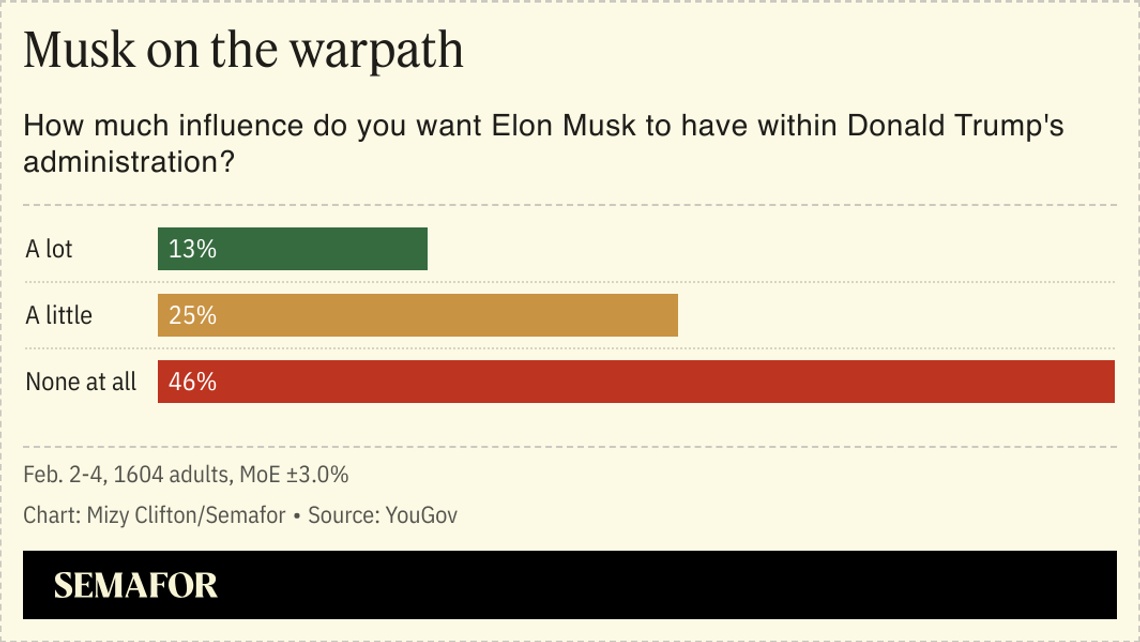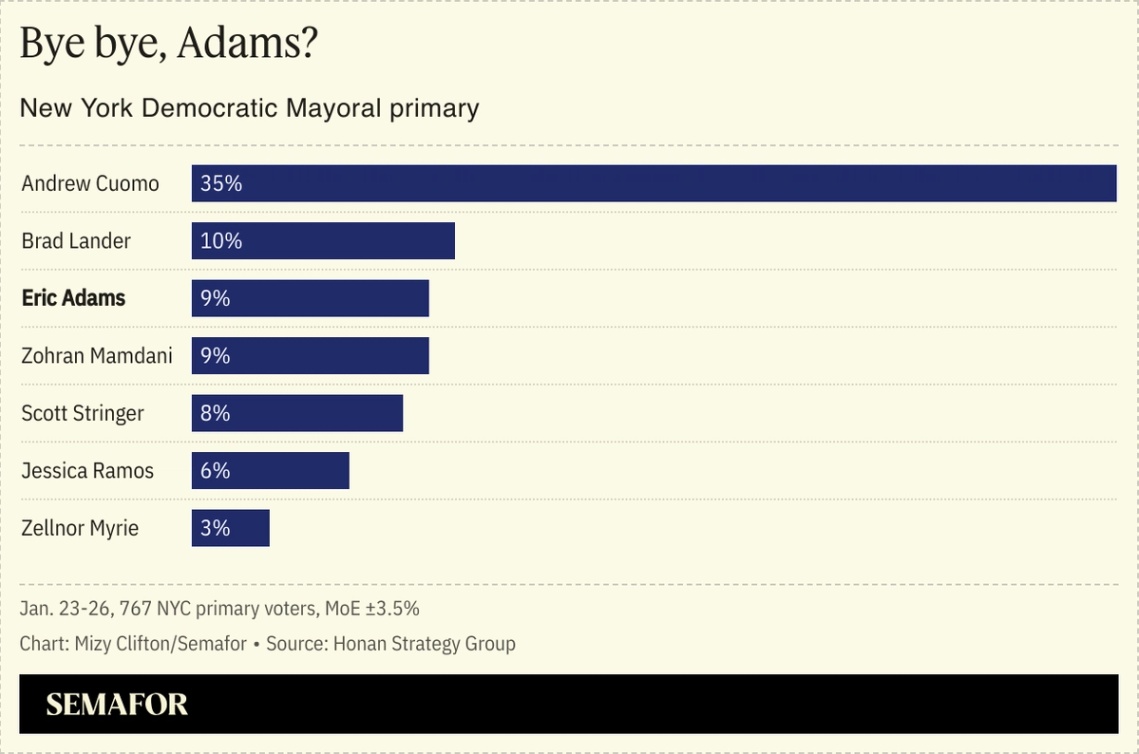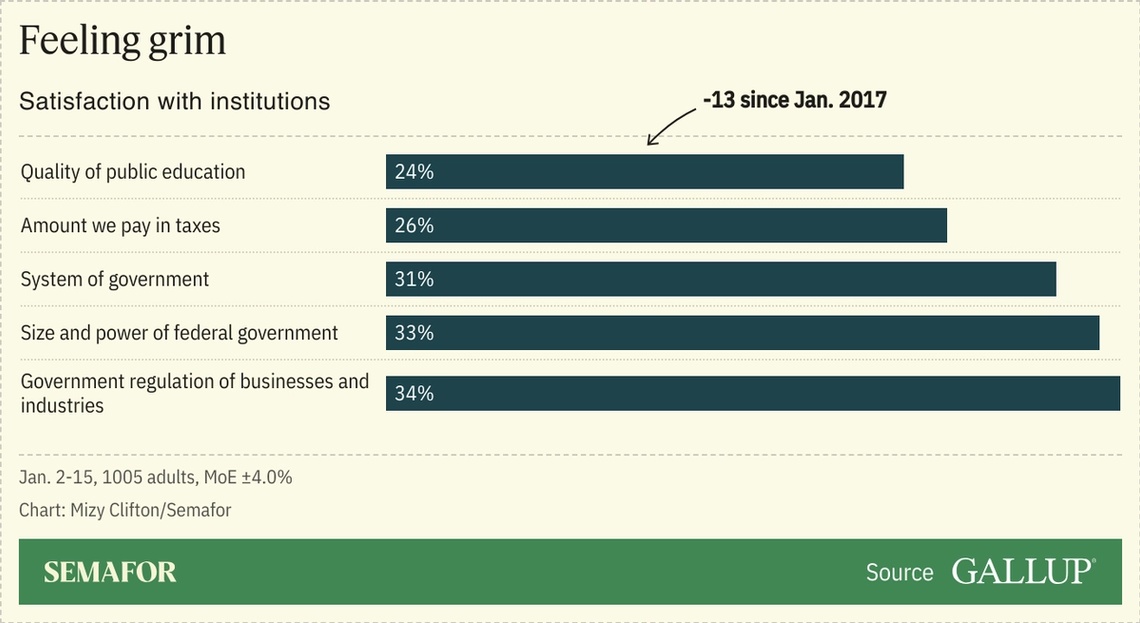 Polls Republicans have been very comfortable defending the new president, the quasi-CEO role he’s given Elon Musk, and the constitutionality of everything they’re doing. Just a third of voters in this poll believe that Trump is violating the Constitution, but nearly half say that Musk has too much influence on the administration. Fifty-six percent say they oppose disbanding the Department of Education, and only 34% support Musk’s muddled buyout offer for federal workers. Democrats are still debating amongst themselves how much to talk about the legality of Musk’s role, versus the decisions he’s made. “I’m much less focused, personally, on who’s appointed or who’s elected,” Texas Rep. Greg Casar told Semafor this week. “I’m much more focused on: Why does the richest guy on Earth get to shut off kids’ pre-K and school lunch programs to enrich himself?”  Mayor Eric Adams has become overwhelmingly unpopular with New York Democrats, and a nonfactor in this year’s campaign, skipping every candidate forum. The candidates who have showed up are waiting for a final decision from Andrew Cuomo, the instant frontrunner if he gets in before the March deadline. His weakness: The highest unfavorable ratings of any non-Adams candidate, at 49%. In a ranked-choice ballot test, Cuomo leads, but doesn’t win a majority until the 6th round of counting, after Adams is eliminated. But he holds significant leads over the field on every issue (crime, the “migrant crisis,” the MTA) except one: Which candidate would be best to clean up corruption. On that question, he leads former Comptroller Scott Stringer by just 2 points, even though both were taken down four years ago by allegations of sexual misconduct, which both of them denied.  Gallup’s omnibus state-of-the-nation polling has found a grim mood for a very long time. On most topics, Americans are more pessimistic now than they were at the start of Donald Trump’s first term. Attitudes about race relations have improved slightly. Nothing else has, even when conditions have objectively gotten better. (The 2017 tax cuts haven’t changed the overall feeling that people are paying too much to the IRS.) DOGE’s work highlights some of that ambiguities. When people are asked about individual program cuts, they’re often opposed to them. But when they’re asked if there’s too much government and red tape, they agree, even more than they did eight years ago. Ads @Team Schimel/YouTube @Team Schimel/YouTube- Schimel for Justice, “Careless.” The content of this spot, from the Republican-backed supreme court candidate in Wisconsin, concerns a botched 2001 prosecution of a rapist from Democrat Susan Crawford’s time in the attorney general’s office. The Crawford campaign disputes the accusation — she didn’t work on the case directly — but is trying to take down the ad for a different reason. Its image of Crawford frowning is altered from a photograph of her smiling. Democrats say that violates the state’s new ban on AI misinformation in advertising, and Schimel’s campaign says they’re protesting too much about a simple alteration.
- Susan Crawford for Wisconsin, “1849.” This year’s Wisconsin supreme court race is just the second since the Dobbs decision, and the second with Democrats warning that Republicans could ban abortion across the state. Here, the Crawford campaign uses remarks that Brad Schimel made to Republicans late last year, defending the state’s 1849 abortion ban, which the court’s liberal majority is expected to strike down unless he wins and flips the balance. “Too extreme,” warns a female narrator, dramatizing how outdated the law with grainy video from decades later.
Scooped!In the first days after the new president took office, Americana readers got a thorough look at how his first executive orders were ripping out not just DEI programs, but the 60-year-old roots of all affirmative action policies. My old colleagues Jeremy Stahl and Mark Joseph Stern broke the news of the administration’s next major project in that vein — a memo from Attorney Gen. Pam Bondi, asking DOJ attorneys to scour businesses and non-government institutions and find the “most egregious and discriminatory DEI and DEIA practitioners in each sector of concern.” Next - 53 days until Wisconsin’s state supreme court election
- 270 days until off-year elections
- 634 days until the 2026 midterm elections
David RecommendsFew surprises have ever been as exposed in advance as Elon Musk’s blitz approach to governing. Reporters who covered his work inside Twitter-cum-X explained how this would work, and had the right insights about how he might change the internal piping of government — which outlets it communicates through, which software it uses. John Herrman’s analysis for New York Magazine, which provocatively calls what’s happening a Musk “bailout,” has something illuminating in every paragraph. |